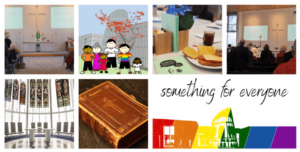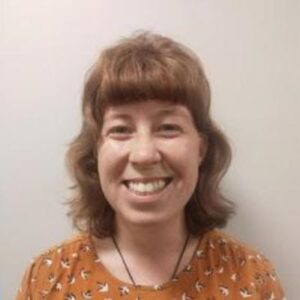‘We all know about the United Nations, but until 2017 I had never heard of the UN Commission on the Status of Women. This year’s priority theme was Rural Women and Girls, and I have slapped a few sets of cups on cow udders in my day; I’ve kept bees and grown vegetables. I’m a rural woman, and a dab hand at hand milking. Obviously, this was going to be important, and I fully intended to bring my influence to bear on international affairs.’
Ellen Bernstein attended the 62nd Session of the United Nations Commission on the Status of Women (UNCSW62) in March 2017.
‘CSW sure does tackle the hard stuff: rape, sexual violence as a psychological weapon of war, early and forced marriage, female genital mutilation, illegal abortions, and how menstruation disrupts young women’s access to education. How does this connect with my sanitised, civilised, safe society?’
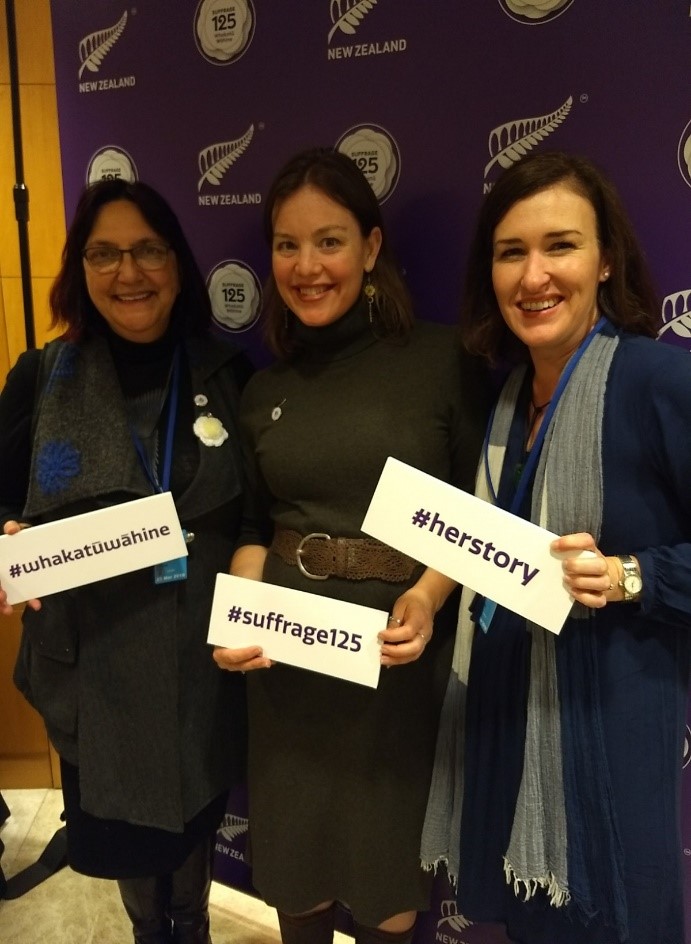
Theme: Challenges & Opportunities in Achieving Gender Equality & the Empowerment of Rural Women & Girls
New York: 11 – 23 March 2018
The Anglican Church of Aotearoa New Zealand & Polynesia Provincial Representative for 2018 nominated by tikanga Pakeha on behalf of the AWSC three tikanga Council – Revd Ellen Bernstein, Vicar of Warkworth Parish, Auckland Diocese.
We all know about the United Nations, but until 2017 I had never heard of the UN Commission on the Status of Women. There have now been 62 such Commissions so perhaps I should have: I am an avid reader with an interest in world affairs. How did I miss this?
The United Nations does have a high profile in other, more critical realms. I think of blue-helmeted peace keepers in conflict zones, or I imagine the Security Council. I picture Nikki Haley sternly warning delegates last December that the US was “taking names” of all those who voted to censure the United States’ position on the status of Jerusalem. That’s the UN. And of course, I think of Helen Clarke, and how nice it might have been if she had got the job as the next Secretary General. But the Commission on the Status of Women had entirely passed me by.
Nevertheless, I boarded my United Airlines flight to New York in early March 2018 imagining that I would be doing something influential. Why else would the Anglican Consultative Council have Category II status with the United Nations Economic and Social Council? And why else would there be an Anglican Communion delegation from all around the world, sent by their primates’ offices? This year’s priority theme was Rural Women and Girls, and I have slapped a few sets of cups on cow udders in my day; I’ve kept bees and grown vegetables. I’m a rural woman, and a dab hand at hand milking. Obviously, this was going to be important, and I fully intended to bring my influence to bear on international affairs.
I was entirely wrong about that. And yet, I was also right, depending on what you mean by influence. My problem (when I finally worked it out) was my privilege. I am from a small nation that stands proud on the global stage. Here we were celebrating 125 years of universal suffrage (I swanned in to a very nice soiree at the New Zealand government’s permanent mission to the UN in honour of the anniversary). Not only am I lucky enough to be an emancipated Enzedder, but I also have a platform for my views; people listen to me every week. I have opinions, I can be articulate. I had researched the ruralness of New Zealand, so I was even ready to say something statistical.
The answer turned out to be in the big number – those 4,300 people from more than 600 organisations create the biggest annual gathering on gender that the United Nations ever sees: as Helen Reddy famously sang: “numbers too big to ignore”. Those thousands of delegates (women and men) attend hundreds of official events hosted by the United Nations, and parallel events which run alongside the official UN programme. For the delegate who can put on flat shoes and a warm coat and hit the sidewalk at a clip, the CSW means two weeks of extraordinary discovery into what is really going on for women around the world.
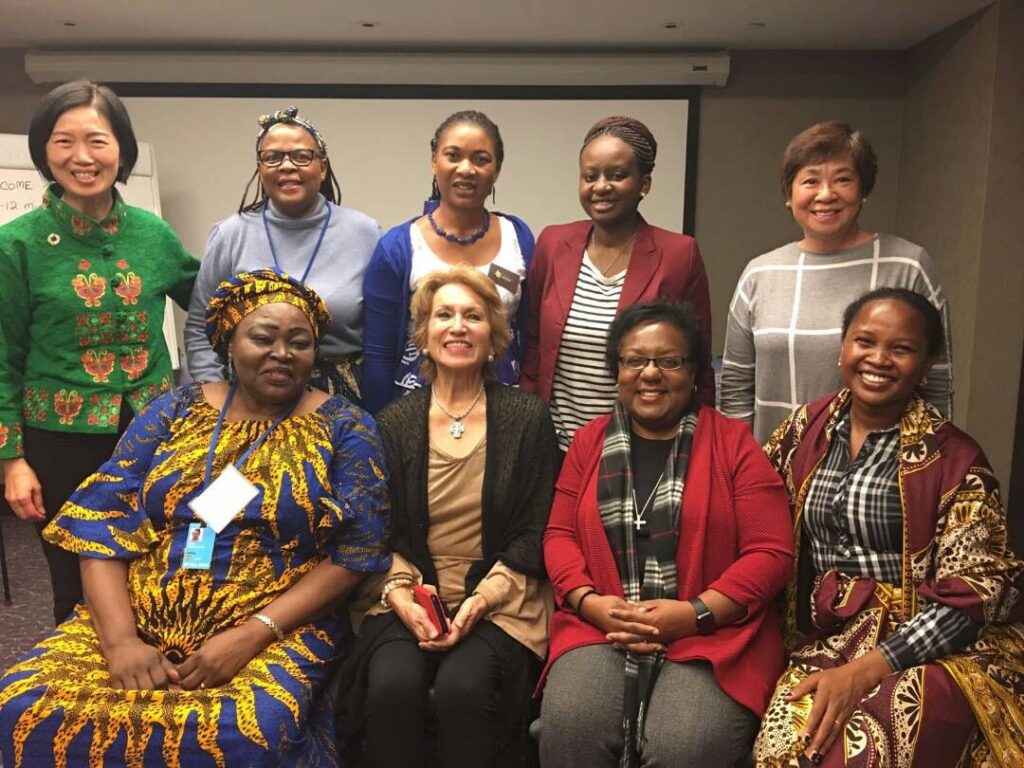
But I was destined to have no particular influence in New York. I wasn’t ever going to stand out. Turns out that some four thousand people flood Manhattan for the Commission on the Status of Women, and they all have opinions, and no shortage of statistics. Almost all of them have something far more important to say than I do. So, if I couldn’t have a personal influence by standing up in the General Assembly and advocating passionately for, say, the children of my country where family violence is normalised, and poverty is real, impressing everyone who heard me with my winning rhetorical style, then what influence could I have?
Being part of the Anglican delegation is the first blessing. From day one, I was part of a programme that was structured to make the most of the time, but with freedom to choose to attend events that were of particular interest. Seventeen other delegates came from nations a bit like mine (Australia, Canada, the UK, the US), and from nations nothing like mine: Mexico, Hong Kong, Japan, Korea. The delegates from nations across Africa created a powerful force: Botswana, Democratic Republic of the Congo, Madagascar, Sudan, Tanzania. I missed seeing Pacific Island nations represented but of course I was our provincial representative this year; our Pasifica sisters do take their turn.
Connecting with the New Zealand government delegation and other New Zealand NGO attendees paid off really well. Our government delegation hosted nightly briefings for interested New Zealanders, and generously included NGO delegates in events and email updates (the aforementioned ECOSOC status does make a difference). The New Zealand government also graciously includes a representative from a lead NGO in its official delegation, meaning that Penny Mudford, the President of Rural Women NZ, participated fully alongside the diplomats and government staff in the two weeks of member state deliberations that took place behind closed doors.
The Anglican Communion delegation was also connected with Ecumenical Women, which brings together delegates from Christian NGOs from all over the world. It was remarkable to worship together in the Church Centre for the United Nations, right across the road from that boulevard of flags we see on the news all the time. I made friends with a doctor from Dunedin, having heard her unmistakeable accent across the room at Ecumenical Women.
I attended dozens of events. My most memorable came from one of the YWCA delegates at the CSW, a young woman from Samoa named Solivalealofiolenu’u Wilson. She described the impact of becoming pregnant aged 14, of being supported by her mum to care for her baby, of finding a new school to attend, and continuing on to the University of Samoa where she is now an economics student. Soli gave a powerful testimony to the strength of the YWCA in Samoa which supported her in her journey and actively builds a future for Samoa’s young women. Soli’s was a wonderful story blending whanaungatanga, faith, a blend of traditional values and contemporary challenges, and 21st century aspirations.
The power and the dangers of the media were a strong topic for side and parallel events at CSW62. I particularly enjoyed the panel discussion facilitated by Polly Toynbee of the Guardian Newspaper, at which Siena Miller spoke of the prejudice she had endured in her acting career, and the crippling effect the cruelty of the tabloid press had had on her emotional wellbeing.
I attended several presentations and panel discussions concerned with gender in the media. Female journalists from some countries struggle to be taken seriously by editors, and female athletes struggle to win the same quality and proportion of coverage in the news media that is afforded to their male counterparts. Where women in sports are featured in magazines and papers their portrayal, both in images and content, tends to be heavily sexualised. Their sporting prowess becomes a minor detail while their outfits, hair styles, social life and family status form the headlines.
Themes around the use of social media featured heavily in the fortnight as well. The #metoo movement and #timesup were mentioned frequently, although of course these reflected concerns of Westernised women rather than those who are pleading for peace, clean water, and access to sexual and reproductive health services. In the General Assembly discussions, the representative from the Holy See did not distinguish himself in his arguments against access to contraception, saying it “stigmatises motherhood”.
I took a close interest in events about news media and social media, as I have become increasingly concerned about the way both platforms contribute to young people’s anxiety about appearance and create unrealistic and unrealisable aspirations about body shape and ideals of “beauty”. As a priest in Aotearoa I am deeply concerned about the constant access young people have to porn and how this is distorting their entire grasp on intimacy and appearance. I was grimly amused to sit through presentations from women in senior leadership positions in places like India, as they revealed with horror and amazement their discovery that young women are seeking cosmetic treatments to improve the appearance of their genital areas. Grimly funny to me only because this is by no means new, and Christian ‘do-gooders’ wanting to understand the pressures on young people in contemporary society today need to know that the grooming ideal for many young women allows for no hair anywhere below the neck. This may be a disturbing level of detail, but anyone concerned with women’s wellbeing cannot afford to be squeamish; our wellbeing is tied up in our bodies and talking about bodies is healthy.
CSW sure does tackle the hard stuff: rape, sexual violence as a psychological weapon of war, early and forced marriage, female genital mutilation, illegal abortions, and how menstruation disrupts young women’s access to education. How does this connect with my sanitised, civilised, safe society? I was getting a haircut from a young woman once while music played in the studio, and the song she was humming along to had the chorus “take a dirty picture; take a dirty picture for me”. It was a hit. And songs like that are why I am a proud, staunch, determined feminist. Half the world’s women have barely any bodily autonomy, while the other half seem to be giving their freedom and dignity away as quickly as they can.
The use of social media can be a boon to isolated women, however, and the Anglican delegates quickly formed a WhatsApp group to keep each other up to date throughout CSW. Some delegates had never seen snow in real life and posted charming videos of themselves making snowballs in 6th Avenue. Others were enchanted to find themselves in the middle of a St Patrick’s Day parade in the middle weekend of CSW and posed for photos with bagpipers and bandsmen. Interestingly, that WhatsApp group has remained active, as the women have returned to their own countries but have wanted to remain faithful in prayer and encouragement to each other.
I attended a parallel event at which a Nigerian-born lawyer described giving up her practice in New York to advocate full time for the return of schoolgirls kidnapped by Boko Haram. Women across African nations, some of them Anglican delegates, spoke movingly and powerfully of the need for clean water, access to education and real jobs, the cost of seeing a doctor (assuming there is even a doctor to see), the loss of livelihoods due to widowhood caused by war, and dozens of other grim living situations they endure on a daily basis. I had heard of all of these issues, but I had never met so many people affected so profoundly by them.
Our Mexican delegate leads a church with her husband. She lives in Texas, so she crosses the US border into Mexico every day. She had a unique perspective on the isolation and poverty she encounters in rural Mexico, and the oppression of drugs cartels which control every aspect of life in remote villages.
The Australian delegate, Ruth Brigden, lives in Darwin, and works as part of a ministry development team providing support, pastoral care and training for indigenous church leaders in the Northern Territory. I took great personal inspiration from Ruth, who has learned to speak Kriol so that she can communicate respectfully within the indigenous context. Ruth describes the challenges women face in remote areas with great honesty, but also deep honour and awareness of the otherness of her own privileged life in relation to her current place of engagement.
Our Korean delegate offered fascinating insight into that nation, as we were continually seeing Korea in the news. I carelessly used the specific terms North Korea and South Korea as though they are two entirely distinct nations, but I learned from Heather that Korea is one at heart. We had the opportunity to hear from Angela Warnick Buchdahl, the world’s first Korean-born female Rabbi and cantor, who was a guest speaker at one of the churches we visited. I missed that presentation however because that event was the same evening as another Korean feature: I was invited to hear Hyesang Park take part in a sublime performance of Brahms’ Requiem at St Thomas Fifth Avenue, with their flawless choir of men and boys.
The worship experiences I had while at CSW will stay with me forever. St Thomas’ provided extraordinary hospitality to the Anglican delegation, with a stunning meal served after a service of Evensong in which the only off-note came from the cantor, sonorously intoning “God save the State” at which point the Welsh delegate and I looked at each other in wide-eyed surprise. St Thomas’ is as ornate and enormous as any major English church, but the congregation is asked not to take photographs while the choir performs, and I was only too happy to obey.
Worship in the chapel at the Episcopal Centre was also a vivid memory. I joined in a First Nations Eucharist presided by the Rt Revd Carol Gallagher who brought her identity as Cherokee to the Eucharist. She is the bishop for Native American Ministries & assistant bishop of the Episcopal Diocese of Montana. I also participated in a Eucharist at which the presiding priest and preacher was none other than the Presiding Bishop Michael Curry, and since I have enjoyed watching his ministry so much (we can all learn from his sermons on YouTube) I was encouraged by my fellow delegates to introduce myself and chat for a few minutes.
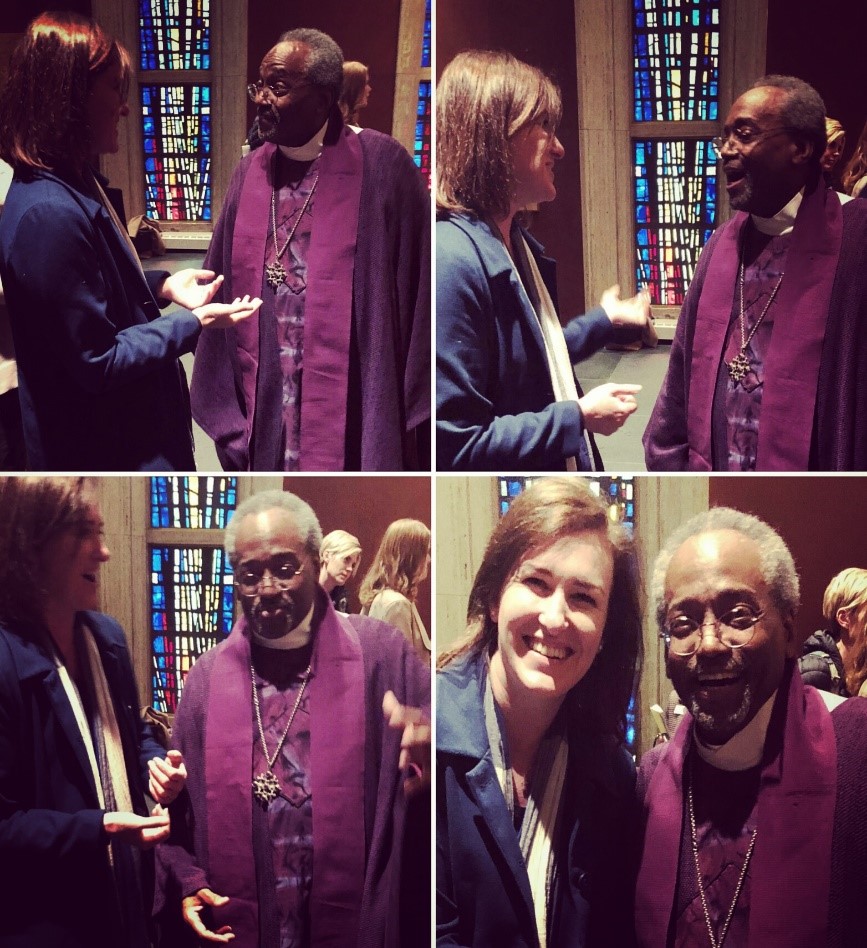
On the middle Sunday morning I took myself to church at St Mary’s Times Square, not without difficulty as Seventh Ave was closed for the running of the New York half marathon. I was greeted warmly as I entered the church and led right to the choir stalls where I joined five other people for a spoken Eucharist. The entire nave of the large church was unoccupied save for two or three people who were sleeping, having sought shelter from the cold. It was a surreal experience to be breaking the bread of Christ, becoming Christ’s body, his work in the world, while homeless people rested quietly alongside us.
I saw people asking for money every day, but they do so by sitting on the footpath with an appeal written on cardboard rather than standing and speaking to the passers-by. When the snow fell hard and the cold really bit, the notices on the cardboard changed, and one man had written “Shelters are unsafe!” on his cardboard. I guessed that people had tried to help him get indoors, but he seemed to prefer the streets. Alongside the street people were staggering quantities of rubbish bags. The first morning I took my walk to the UN from my hotel, I assumed it was a weekly rubbish collection, but it became apparent that rubbish is collected daily, in unimaginably vast quantities.
The non-existence of recycling was a real concern to some of the delegates. Anne-Marie, (the doctor from Dunedin) and I took over the clear up at a couple of our Ecumenical Women meals, since everything was thrown away: plates, cutlery, table “cloths”, the tongs and platters, cups and bottles. Everything, including the food waste, is simply bundled up into rubbish bins with no sorting or recycling of any kind. The most she and I could manage was to stack everything together so that at least it would take less space in land fill. The locals looked at us as though we were both insane and offensive, and I did feel bad for implying that their hospitality was in any way lacking. The waste created by my presence in New York is the single regret I have from the experience, and has reinforced my own desire to reduce, reuse and as a last resort recycle as much as I can, and to suggest to anyone who will listen that Christianity requires it of us.
I will take away the sense of standing on the threshold of history as the Commission was opened on the great stone podium of the main chamber of the General Assembly building. I will never forget hearing the Secretary General António Guterres tell us he is a proud feminist and realising that he works in at least four languages: he took questions from the floor at the “Town Hall” meeting (which is held at the UN, not in a town hall) and responded directly to people in English, French, Portuguese and Spanish. I wonder how many languages Helen speaks.
The United Nations is not unlike the work of the Church in the world. We are seeking not to coerce, but to persuade. We cannot force peace on anyone, but we can entreat people to pursue it. We may have status, but no real power, and the statement reached by the member states of the Commission (they thrashed out a set of agreed conclusions over two weeks of hard work) will have no impact if leaders of nations choose to ignore it.
I will probably never go to the UN again, so it remains for me to be grateful for the privilege of being at this event, to thank the Primates very sincerely for funding my travel, for the guidance I received from Archdeacon Carole Hughes and the help given to me by Michael and Marissa in the General Synod office. I have heard first hand things I had only read about before, and I will try not to take anything for granted about the privilege of being an ordained woman here in the islands of my homeland: in a country where it is illegal to claim the right to discipline a child by hitting her, where anyone can marry the person of their choosing, where right now the Head of State, the Governor General, the Prime Minister and the Chief Justice are all women.
This is a country of great privilege, but family violence is normalised, and poverty is real… we still have much work to do. Nga mihi nui ki a koutou.
Revd Ellen Bernstein
May 2018
